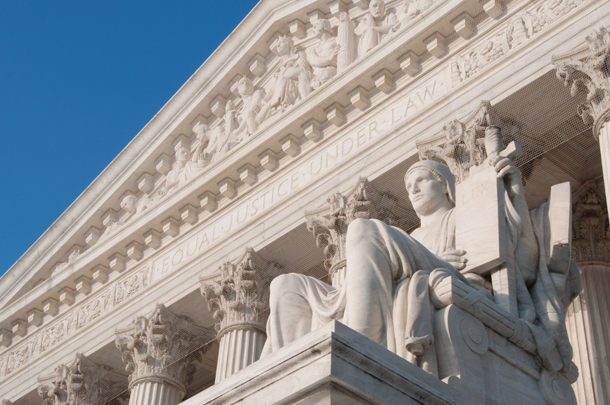Supreme Court Unanimously Rejects Climate Lawsuit
Published: February 6, 2018
By Mitra Taj

Justices say the Clean Air Act trumps federal common law, but has left the door open to claims based on state common law.
By Mitra Taj
The Supreme Court ruled today states cannot sue power companies for their contribution to climate change. Mandating emissions reductions, all eight participating justices agreed in the case American Electric Power Co v. Connecticut, is the duty of the Environmental Protection Agency under the Clean Air Act.
The Court also explicitly rejected arguments made in April that federal courts shouldn't have any jurisdiction over climate change because it's too political, and that climate change is too global a problem for litigation.
The decision was a big legal victory for electric utility companies, which together make up a third of U.S. greenhouse gas emissions.
The ruling limits the ability of climate advocates to use the courts if Congress legislates away the EPA's climate authority, but environmental groups also saw positives in the decision.
"Today’s ruling reaffirms the Environmental Protection Agency’s duty under the nation’s 40-year-old Clean Air Act to safeguard public health and welfare from dangerous carbon pollution," said David Doniger, an attorney who helped represent the states in bringing this case, in a statement. "Now the EPA must act without delay.”
While the Court said that the Clean Air Act trumps federal common law on climate change, it didn't address whether it also displaces state common law.
"They did not answer the question of whether there could also be a state common law remedy available. They left that for subsequent decisions," said Pat Parenteau, professor of environmental law at Vermont Law School.
"That means that cases like Kivalina are still alive," he said, referring to Kivalina v. Exxon, in which Alaskan natives sued two dozen energy companies for their harmful contribution to global warming, and alleged efforts to mislead the public about climate change.
The plaintiffs in that case used both state and federal public nuisance laws to argue they should be compensated for being forced to abandon the village of Kivalina because of rising sea levels driven by climate change. Consideration of the Kivalina case was put on hold at the Ninth Circuit Court of Appeals pending today's Supreme Court Decision, and Parenteau says plaintiffs might win a remand to pursue the state common law basis for damages.
"The importance of today's ruling is what it didn't do, which is to accept the industry arguments that federal courts should never hear a public nuisance action for climate change damage," said Parenteau.
--------
Click here for the Court's decision, here for LOE's coverage of oral arguments made in April, and here for more on the Kivalina case.
Back to Living on Earth
Living on Earth wants to hear from you!
Living on Earth
62 Calef Highway, Suite 212
Lee, NH 03861
Telephone: 617-287-4121
E-mail: comments@loe.org
Newsletter [Click here]
Donate to Living on Earth!
Living on Earth is an independent media program and relies entirely on contributions from listeners and institutions supporting public service. Please donate now to preserve an independent environmental voice.
NewsletterLiving on Earth offers a weekly delivery of the show's rundown to your mailbox. Sign up for our newsletter today!
 Sailors For The Sea: Be the change you want to sea.
Sailors For The Sea: Be the change you want to sea.
 The Grantham Foundation for the Protection of the Environment: Committed to protecting and improving the health of the global environment.
The Grantham Foundation for the Protection of the Environment: Committed to protecting and improving the health of the global environment.
 Contribute to Living on Earth and receive, as our gift to you, an archival print of one of Mark Seth Lender's extraordinary wildlife photographs. Follow the link to see Mark's current collection of photographs.
Contribute to Living on Earth and receive, as our gift to you, an archival print of one of Mark Seth Lender's extraordinary wildlife photographs. Follow the link to see Mark's current collection of photographs.
 Buy a signed copy of Mark Seth Lender's book Smeagull the Seagull & support Living on Earth
Buy a signed copy of Mark Seth Lender's book Smeagull the Seagull & support Living on Earth

